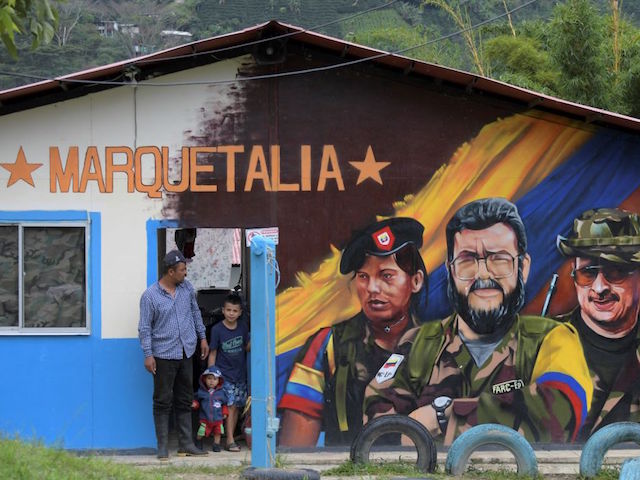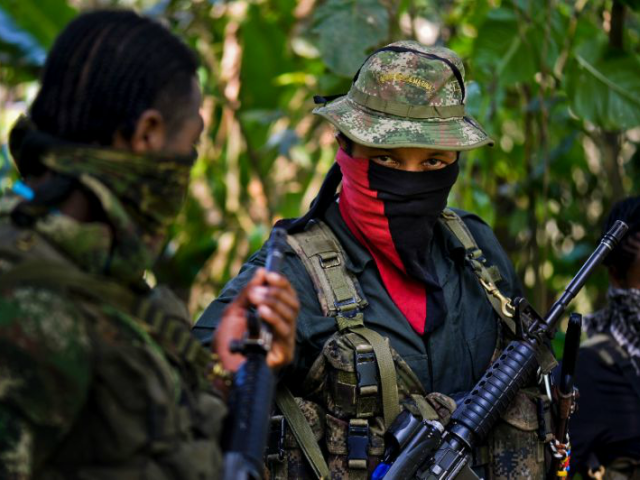Colombian officials on Thursday accused members of the National Liberation Army (ELN) and the Revolutionary Armed Forces of Colombia (FARC) – the two largest communist terrorist groups in the country – of opening fire at a Children’s Day event on Wednesday hosting 3,000 children.
Local media documented four serious injuries, including a 14-year-old girl shot in the chest.
The town of El Tarra, North Santander, was hosting its annual Children’s Day festivities on Wednesday afternoon at the local sports stadium when armed terrorists began to attack what police believe was intended on a neighboring military complex. The terrorists opened fire within the stadium, however, sending children and parents running in all directions.
Shocking eyewitness videos show screaming parents pleading with the unseen terrorists over gunshots, carrying the injured child out of the venue, while an event organizer on the stadium loudspeaker informs the attackers they are firing on children.
“Please stop shooting, they injured someone here, these are children,” a woman’s voice booms on a loudspeaker. “Please, those who are shooting, these are children, don’t shoot!”
Other videos from the scene show terrified parents running, while others choose to stay and lie flat on the ground, covering their children.
“It was not safe to stay on the field,” an unidentified parent at the event told the Colombian newspaper El Tiempo. “I grabbed my girl and my neighbor’s kids and we started running. The kids were crying, they were very afraid. Thank goodness nothing happened to us.”
“It’s so sad, it fills you with impotence, with uncertainty of how illegal armed groups and the public [law enforcement] forces were indiscriminately shooting intermittently in the armed conflict they had, leaving the civilians who had nothing to do with that in the middle of it all,” another parent told Colombia’s RCN Radio anonymously.
The Colombian magazine Semana identified the child injured as 14-year-old Karen Daniela Carrero Rivera, who “received a bullet impact on the upper chest and, given the gravity of the injuries, was transferred to the city of Cúcuta, where she is now out of danger.” The newspaper reported that a parent, identified only as “Arturo;” a soldier; and a police officer were also injured enough to require medical attention. Authorities have not confirmed any deaths. El Tiempo identified the injured parent as Carrero’s father.
The Armed Forces of Colombia issued a statement on Thursday accusing the ELN of executing the terrorist attack.
“In a reprehensible, cruel, inhuman act full of barbarism, this Wednesday, April 27 … ELN terrorists, in alliance with the organized armed group Structure 33, attacked with firearms and explosives the civilian population,” the Armed Forces confirmed, “in total disregard for the presence of boys, girls, and adolescents. They also similarly attacked the military base on the outskirts of the municipality.”
The military said it “rejects this cowardly terrorist act, a clear sign of the violation of human rights and violation of international humanitarian law on the part of these criminal groups, united to attack the civilian population and public forces.” It vowed to send “a large and complete security force” to the area, but did not mention any arrests or name any suspects in the attack.
The ELN is a communist guerrilla terrorist group designated as a foreign terrorist organization by the United States, with ties to drug traffickers and the socialist regime in Venezuela.
“It is currently the most powerful criminal group in Colombia and Venezuela, controlling vast areas of coca crops, cocaine production and distribution routes, as well as a heavy involvement in illegal gold mining,” the violence monitor Insight Crime explained in its profile of the group. “Believed to be heavily supported by the Venezuelan regime in exchange for a cut of criminal profits, the ELN has become a truly transnational criminal group, operating in both countries freely and controlling much of the criminal economies along the border.”
The mayor of El Tarra, Yair Díaz, has similarly condemned the attack but, at press time, has not named any individuals arrested or suspected of having organized and perpetrated the attack. Police do not seem to have apprehended a single attacker on the scene despite a military base being located feet away from the site of the attack.
“These kinds of events are already recurring in this town,” Díaz told RCN radio. “The two groups engaging in confrontational activity are the 33 group and the FARC and ELN dissidents. In the case of the town of El Tarra, the confrontation that happened is against the La Esperanza military base.”
Díaz urged the government to consider relocating the base, which is located next to the stadium, to save his residents from attacks. He also announced residents had organized a peaceful protest against the terrorist attack on Friday.
Díaz added to the lists of suspects FARC “dissidents,” a misnomer used by the Colombian government for active FARC terrorists.
Under former President Juan Manuel Santos, the Colombian government signed a “peace deal” with FARC leaders in 2016. Colombian law requires a popular referendum to approve such a move, but the Colombian people voted against the deal. Santos responded by illegally ramming the deal through Congress.

A man and children stand next to a graffiti of late FARC commander Alfonso Cano (C) at El Oso Territorial Training and Reincorporation Area (ETCR), in Gaitania, Tolima Department, Colombia, on October 27, 2021. (RAUL ARBOLEDA/AFP via Getty Images)
The FARC had been engaged in armed narco-terrorism against civilians for over half a century at the time of the signing of the deal. Following the agreement, FARC leaders received uncontested seats in Congress and mostly enjoyed amnesty provisions despite the FARC’s history of murder, kidnapping, child rape, use of child soldiers, infanticide, and other heinous crimes. Colombia produced record amounts of cocaine in 2017, the year after the deal was signed, and several senior FARC leaders returned to terrorism shortly thereafter.
As many FARC terrorists and organization leaders broke the agreement with Santos, in an attempt to preserve the public image of the deal, Colombian officials refer to FARC terrorists who engage in terrorism as “dissidents” from the organization no matter how high-ranking they are in the organization.
President Joe Biden removed the FARC from America’s list of Foreign Terrorist Organizations late last year.
The attack arrives as Colombia edges closer to its presidential election at the end of May, where a former member of a Marxist terrorist organization, Gustavo Petro, is currently leading the race. After leading the M-19 terrorist organization, Petro served as the mayor of the capital, Bogotá.

COMMENTS
Please let us know if you're having issues with commenting.